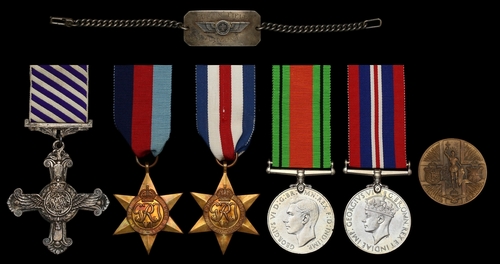
Auction: 25002 - Orders, Decorations and Medals
Lot: 191
A poignant Second World War D.F.C. group of five awarded to Squadron Leader A. E. 'Ben' Foster, Royal Air Force Volunteer Reserve
Having been decorated for his gallantry as a Lancaster pilot in No. 61 Squadron - including his part in the famous daylight raid on Le Creusot in October 1942 - he commenced a second operational tour in No. 630 Squadron and was Killed in Action in a costly strike on Wesseling in June 1944
Distinguished Flying Cross, G.VI.R., the reverse officially dated '1943', in its Royal Mint case of issue; 1939-45 Star; France and Germany Star; Defence and War Medals 1939-45, these in their original O.H.M.S. card forwarding box addressed to his next of kin, with ticker tape print out and Air Council condolence slip in the name of 'Squadron Leader A. E. Foster, D.F.C.', together with silver identity bracelet, with central Southwest Airways Inc. wings and further engraved, 'Falcon Field, Arizona' and a commemorative medallion for the Wembley Torchlight Tattoo 1925, in bronze, in F. Phillips, Aldershot case of issue, overall very fine (7)
D.F.C. London Gazette 12 March 1943, the original recommendations states:
'Flight Lieutenant Foster has during his tour of 30 sorties been one of the outstandingly successful pilots of this squadron. Throughout he has displayed a fine offensive spirit and shown great determination in driving home his attacks. He took a conspicuous part in two daylight raids on Le Creusot and Milan. On 10 September 1942, during a raid on Dusseldorf, and engine was hit and put on fire. The fire was extinguished, and Flight Lieutenant Foster went on for his attack with three engines.
For such meritorious service, this officer is strongly recommended for the award of the D.F.C.'
Arthur Edgar 'Ben' Foster was commissioned as a Pilot Officer in the Royal Air Force Volunteer Reserve in November 1941, on the very same day as his twin brother, Alec. Both were destined to witness active service as pilots in No. 61 Squadron, a Lancaster unit operating out of Syerston, Nottinghamshire. Tragically, both were also destined to be killed in action, in Alec's case in a strike against Karlsruhe on 3 September 1942.
For his own part, Arthur commenced his operational career with three successive '1000 bomber raids' on Cologne, Essen and Bremen in May-June 1942. A a busy tour ensued, September witnessing seven further sorties, including a return trip to Bremen and strikes against Duisberg, Dusseldorf, Frankfurt and Munich. In October, he headed back to Cologne, as well as attacking Kiel and Osnabruck.
But the most memorable outing of the month was surely Operation 'Robertson', the daylight raid against Le Creusot on the 17th, when 94 Lancasters from No. 5 Group were assigned to attack the Schneider works, the whole under Wing Commander L. C. Slee, the C.O. of No. 49 Squadron.
Foster piloted one of seven 61 Squadron aircraft allocated to the force, he and his crew having undertaken special low-level flying exercises over Lincolnshire in the interim. Despite the obvious risks, the raid turned out to be a great success, just one Lancaster becoming a cropper after hitting a roof top. Others suffered damage from bird strikes, as the force raced over 300 miles of French countryside at tree-top height, but all returned home, having delivered their attack in just seven minutes. Even the likes of Guy Gibson - who led six aircraft against the nearby transformer station at Montchanin - appeared to be satisfied with the results.
'Bomber' Harris was also impressed and ordered another daylight raid, this time against Milan, in which Foster participated on the 24th. In fact, Foster was to make five further trips to Italy over the next month or so, namely three sorties to Turin and two to Genoa. These besides sorties to Mannheim, Munich and Stuttgart. Tour expired, he was awarded the D.F.C. and rested.
In June 1944, Foster returned to an operational footing in No. 630 Squadron, a Lancaster unit which was based at Spilsby, Lincolnshire. Appointed to the command of 'A' Flight in the acting rank of Squadron Leader, he flew his first sortie against Caen on the night of the 6th, followed by trips to the Forest de Cerisy on the 7th and a strike on Caen's bridges on the 12th. Tragically, his next sortie - flown against Wesserling on the 21st - proved to be his last, nothing being heard from his Lancaster ND 531 'K-Kitty' following take-off. But his loss, and that of his crew, was likely attributable to night fighter activity. It proved a costly outing for Bomber Command and 630 Squadron lost seven aircraft alone.
One airman's recollection of the night's events, after crossing the coast, illustrates the scale of the enemy night fighter onslaught vividly:
'Immediately fighter flares began to light up the sky and bombers began to go down in flames. We were supposed to record the positions of aircraft we saw shot down. Normally I would tell Jack (navigator) where a stricken aircraft could be seen relative to our position on his chart. At that precise time, I was reporting the positions of aircraft going down in flames faster than he could plot the positions on his chart. I soon ceased to mention them because I felt such a devastating spectacle would be demoralising for the rest of our crew. All the way to the target and all the way back, aircraft were going down in flames.'
In common with his twin brother, Arthur - who was 23 - is commemorated on the Runnymede Memorial. A truly tragic outcome for Frank and Ellen Foster of Chertsey, Surrey, their beloved parents.
Subject to 20% VAT on Buyer’s Premium. For more information please view Terms and Conditions for Buyers.
Sold for
£2,000
Starting price
£1100




